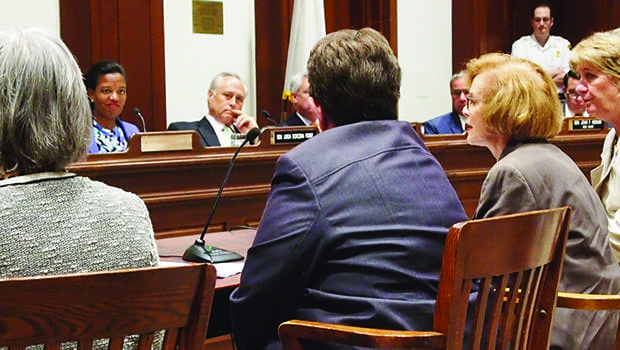
Massachusetts state senators, representatives and sheriffs were among dozens who turned out to a State House hearing July 23 in support of Senate bill 1812, which would end the legal requirement to suspend driver’s licenses for people convicted of non-violent, no-vehicle-related drug offenses for up to five years.
Arguing that the suspensions place an unfair burden on ex-offenders struggling to turn their lives around, criminal justice reform activists testified before the Joint Committee of Transportation to vote favorably.
“I think you can change a lot of lives,” said Middlesex County Sheriff Peter Koutoujian. “I think you can save a lot of lives. I think you can save a lot of taxpayer dollars.”
The bill is somewhat of a low-hanging fruit in the bounty of criminal justice reform legislation coming before lawmakers this year. Among the bills filed by members of the Black and Latino Caucus, the Progressive Caucus and individual legislators were measures ending mandatory minimums for drug offenses. Also included were proposals for mandatory reporting by police departments of data on police stops by race, and mandatory independent reviews of police shootings.
“All of these reforms would work toward minimizing the prison population, which is so overgrown,” said Delia Vega, executive director for local and state organizing with Ex-prisoners and Prisoners Organizing for Community Advancement. “The state would save money that could be diverted into real job creation.”
Vega and others turned out the State House in support of Senate Bill 1812 as part of the Jobs Not Jails Coalition, a group of community organizations from across the state backing criminal justice reforms legislators are advancing this year.
The mandatory minimum sentences were passed by the Legislature back in the 1990s as part of a national wave of get-tough-on-crime efforts that caused sentences for to drug offenses grow longer and prison populations to swell. Massachusetts currently spends an average of $53,000 a year for each prisoner it houses, amounting to $2.7 billion of the state’s $38 billion annual budget.
The increasing costs of incarceration, along with an opioid-fueled influx of white and suburban drug users into the criminal justice system, has led to a growing recognition that the state’s heavy focus on mandatory minimum sentences for low-level drug offenders places a heavy burden on communities, and on the state budget.
Political leaders including Gov. Charlie Baker, Senate President Stanley Rosenberg and House Speaker Robert DeLeo last week sent letters to the U.S. Justice Department and the Pew Charitable Trusts requesting help with policy recommendations and data analysis in an effort aimed at making the state’s criminal justice system more effective, according to a Boston Globe report.
Suffolk County Sheriff Steve Tompkins, who submitted written testimony at the July 23 hearing on license suspensions, has long advocated reforming sentencing guidelines.
“With crimes like murder, rape, assault — if there are mandatory minimums, so be it. But for low-level offenders, we should not be spending millions of dollars to lock them up,” he said. “We should be putting money into treatment and rehabilitation.”
Driving consensus
Although the anti-license suspension bill enjoys bipartisan support, a similar bill filed in the last legislative session failed to pass.
“Sometimes bills like this require a little more time,” said the bill’s sponsor, Majority Leader Harriet L. Chandler.
Chandler noted that in last week’s hearing, the bill had visible support from members of the Joint Committee on Transportation as legislators and other elected officials testified in support of it.
“You saw them nodding their heads,” she said. “I haven’t seen that in a long time.”
Vega echoed Chandler’s optimism.
“This bill will be easier to pass in the sense that so many people are in support of it,” she said. “There’s a broad spectrum of people impacted by this. And this will have a positive impact on people in an immediate way.”
Kimeshia Brown, whose fiancé served time for drug possession, says the mandatory suspension forces her to do all the driving for the couple’s three children. And her fiancé, who works in construction, misses out on jobs that aren’t within walking distance of their Worcester home.
“Most of the jobs require access to a vehicle to get to work,” Brown said. “My fiancé takes odd jobs here and there, whenever he can. He’s trying to turn his life around. But it hasn’t been easy. It puts a lot of financial stress on us.”






